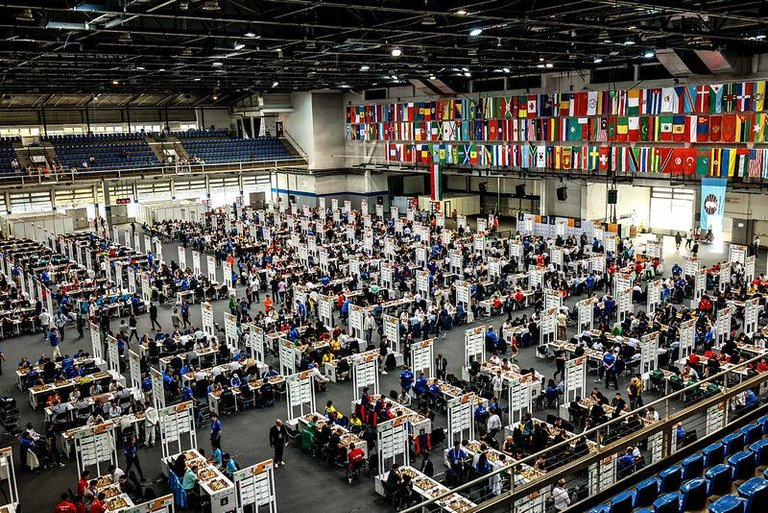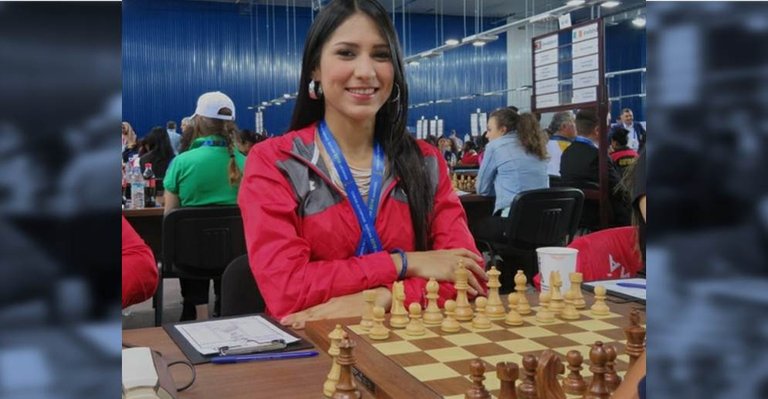
Tenía dos temas en mente para hoy, inclusive algunas notas a mano alzada con puntos a tratar, pero el amigo @tonyes me robó ambas temáticas, bueno no tan así, solo se adelantó un poco y es exclusivamente culpa mía porque no he podido dedicarme al feed en estos últimos días.
Sin embargo, siempre hay temas para hablar de deportes y si prestamos atención a lo que escriben otros, podemos opinar, intercambiar pareceres y quizás escribir algo con la entidad suficiente como para convertirse en un artículo concreto, con información relevante; solo hay que sentarse, leer, pensar, investigar y luego pasar a la acción. Fácil.
El artículo de @tonyes sobre las olimpíadas de ajedrez y la heterogeneidad de algunos de los equipos participantes respecto a la étnica de sus integrantes, me hizo reflexionar sobre el porqué de esa consecuencia y cuáles son las causas reales o supuestas en algunas selecciones nacionales deportivas donde representar las raíces de un país ha quedado en el olvido reemplazado por otras conveniencias como la de aspirar al triunfo para poner en lo más alto del podio los colores de una determinada bandera.
Probablemente esté simplificando un tema que es mucho más complejo, pero ya estamos en el baile y vamos a bailar.

Debido a la globalización y también a la migración por diferentes motivos como el de escapar de una guerra o de una tiranía o por buscar otros destinos que excluyan el hambre o la ignorancia y brinde oportunidades diferentes y concretas, hoy en día en muchas actividades humanas en las que, por supuesto incluyo los deportes y me dedicaré a hablar exclusivamente de ello, los países que reciben a los migrantes arman equipos que están formados en una buena proporción por jugadores que provienen de otros lugares o que siendo nacidos en el país son hijos de inmigrantes.
Los Estados Unidos es un caso típico, si observamos el equipo de ajedrez que compite en estas olimpíadas que comenzaron hace pocos días, la mayoría de sus jugadores son nacidos en otros países o como dije antes, nacidos en su territorio, pero hijos de inmigrantes. Eso no está mal por supuesto, es una consecuencia lógica del cambio de lugar de residencia de las personas y no hay forma de evitarlo.
Para continuar con los ejemplos de esta olimpíada de ajedrez, tenemos la otra cara de la moneda en la India, donde todos sus integrantes son oriundos de esa nación, por supuesto, este país tiene una enorme población, la más grande del planeta, y el talento suficiente como para no tener que buscar recursos fuera de su propio contorno, tampoco es una nación que se caracterice por recibir gran inmigración, por el contrario, muchos se han ido y continúan yéndose a buscar sus oportunidades o al menos a capacitarse en las mejores universidades que el primer mundo pueda ofrecer.

El problema que yo veo se centra en la conveniencia económica y política, muchos, pese a haber nacido y formado en el país de sus raíces cambian de bandera principalmente por dinero y fama, el que lo ofrece es también culpable porque busca el rédito, generalmente político, de ver los colores de su nación en lo más alto de un podio.
Mi país históricamente ha recibido una gran cantidad de migrantes, de hecho y particularmente hablando del ajedrez, hemos tenido al extraordinario Miguel Najdorf que nacido en Polonia vino a la Argentina a jugar en representación de su país, justamente en un juego olímpico y lo atrapó aquí el inicio de la segunda guerra mundial, se quedó, se enamoró del país y formó una familia, trabajó y representó nuestros colores por muchísimos años, no lo hizo por conveniencia sino por convicción, pudo haber vuelto al finalizar el conflicto. Hay otros casos en ese y muchos otros deportes.
Como sea, no veo ninguna solución a esto que he planteado, es más, quizás para la mayoría de los que leen ni siquiera sea un problema. Pero para mí sí, particularmente no me gusta ver un equipo de un país formado mayoritariamente por nacidos en otros países, los que lo hacen por obtener una ventaja económica lo percibo como una traición a sus raíces, a su cultura y a sus ancestros.
Tendré que conformarme, ya aprendí que no puedo tapar el sol con la mano, por lo tanto, voy a hacerme el distraído y trataré de disfrutar de las olimpíadas de ajedrez, principal culpable de esta publicación.
World athletes
I had two topics in mind for today, including some freehand notes with points to discuss, but my friend @tonyes stole both topics from me, well not quite like that, he just got ahead of himself a little and it's exclusively my fault because I haven't been able to dedicate myself to the feed these last few days.
However, there are always topics to talk about in sports and if we pay attention to what others write, we can give our opinions, exchange opinions, and perhaps write something with enough substance to become a concrete article, with relevant information; you just have to sit down, read, think, research and then take action. Easy.
@tonyes' article on the chess Olympiads and the heterogeneity of some of the participating teams regarding the ethnicity of their members, made me reflect on the reason for this consequence and what the real or supposed causes in some national sports teams were representing the roots of a country has been forgotten, replaced by other conveniences such as aspiring to triumph to put the colors of a certain flag on the top of the podium.
I am probably simplifying a subject that is much more complex, but we are already in the dance and we are going to dance.
Due to globalization and also to migration for different reasons such as escaping from a war or a tyranny or seeking other destinations that exclude hunger or ignorance and offer different and concrete opportunities, today in many human activities which, of course, include sports and I will dedicate myself to speaking exclusively about it, the countries that receive migrants put together teams that are formed in a good proportion by players who come from other places or who, being born in the country, are children of immigrants.
The United States is a typical case, if we look at the chess team that competes in these chess Olympiads that began a few days ago, the majority of its players are born in other countries or as I said before, born in its territory, but children of immigrants. That is not bad of course, it is a logical consequence of the change of place of residence of the people and there is no way to avoid it.
To continue with the examples of this chess Olympiad, we have the other side of the coin in India, where all its members are natives of that nation. Of course, this country has a huge population, the largest on the planet, and enough talent to not have to look for resources outside its surroundings. It is not a nation that is characterized by receiving a large immigration, on the contrary, many have left and continue to leave to seek their opportunities or at least to train in the best universities that the first world can offer.
The problem that I see is centered on economic and political convenience. Many, despite having been born and educated in the country of their roots, change flags mainly for money and fame. The one who offers it is also guilty because he seeks the benefit, generally political, of seeing the colors of his nation at the top of a podium.
My country has historically received a large number of migrants, in fact, and particularly speaking of chess, we have had the extraordinary Miguel Najdorf who was born in Poland and came to Argentina to play representing his country, precisely in an Olympic game and was caught here by the beginning of the Second World War, he stayed, fell in love with this people and started a family, worked and represented our colors for many years, he did not do it out of convenience but out of conviction, he could have returned at the end of the conflict. There are other cases of that and many other sports.
Anyway, I don't see any solution to what I have raised, in fact, perhaps for most of those who read it is not even a problem. But for me it is, I don't like to see a team from a country formed mostly by people born in other countries, those who do it to obtain an economic advantage I perceive it as a betrayal of their roots, culture, and ancestors.
I'll have to make do with it, I've already learned that I can't cover the sun with my hand, so I'm going to pretend I don't notice and try to enjoy the chess Olympiads, the main culprit of this post.
Héctor Gugliermo
@hosgug